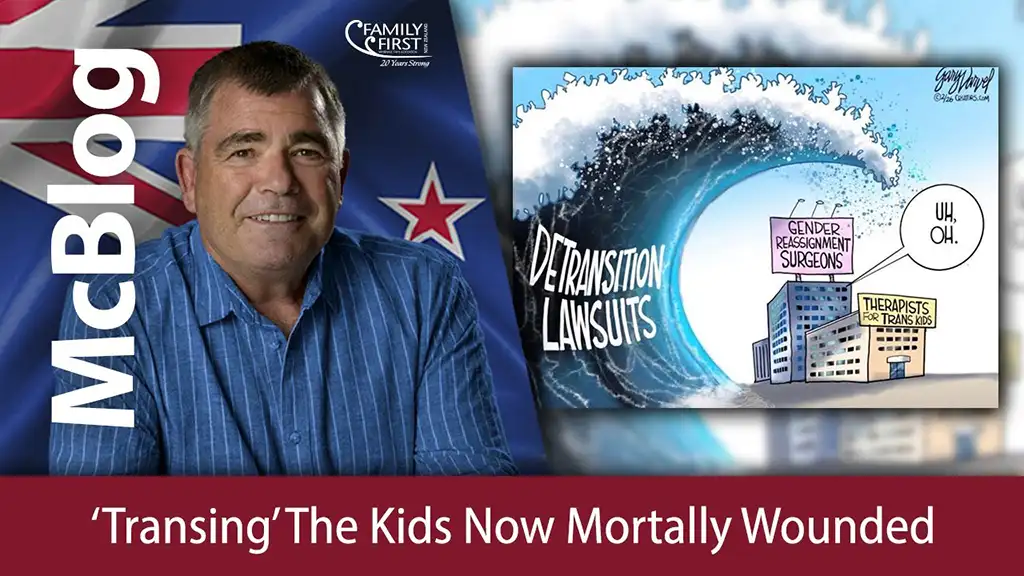The headline in the Herald on Sunday screamed “School violence on the rise: Thousands of students stood-down or suspended for physically assaulting peers each year.” Are you surprised? You shouldn’t be. Children born at or around the time of the passing of the anti-smacking law or after it are now teenagers and children. Using government data, we examine the result of this grand social experiment – data which political and academic leaders refuse to acknowledge, instead lazily blaming bad behaviour on COVID and the climate.
TRANSCRIPT:
The headline in the Herald on Sunday screamed School violence on the rise: Thousands of students stood-down or suspended for physically assaulting peers each year.
Are you surprised? You shouldn’t be.
One of my most famous interviews when I was at Radio Rhema in the early 2000s was my weekly chat with then PM Helen Clark. It was 2005 and she was championing Sue bradford’s anti-smacking law.
And this interview happened . I’m the interviewer.
Well, she didn’t get much right – but she definitely got this statement right. To ban smacking would defy human nature.
Despite Sue Bradford calling it an anti-smacking law, the politicians and the media said it wasn’t an anti-smacking law – but it was. We all knew that. But Helen Clark and Sue Bradford were doing their best to try and dupe everyone.
But the politicians (including the National party led by John Key) rammed through the law despite 87% of the public (as we found out in the ensuing referendum) opposing the law.
And despite John Key calling the law a dogs breakfast.
But hey – it’s just parents being criminalised. Big deal.
Of course we knew what the real effect of the law was – it was to criminalise good parents raising great kids, and despite what you hear from the political elite, it has done exactly that. We have the legal proof including analysis from legal experts such as top public law lawyer Mai Chen – and the testimonies of parents which you can watch on our website protectgoodparents.nz
But we’ve now had almost 16 years to watch the fallout from the law. In other words, children born at or around the time of the passing of the anti-smacking law or after it are now teenagers and children.
So what has been the result of this grand social experiment.
Well, let’s read the NZ Herald article
The number of students stood down or suspended for physically assaulting staff or students has increased 66 per cent in the past 11 years – and teachers are reporting dealing with more instances of violence than in the past.
Ministry of Education data shows 8251 students were stood down or suspended for attacking their peers in 2022 compared with 4935 in 2012.
(so that’s the 66% increase. Just under 5,000 to now being over 8,000)
The same figures show 993 students were stood down or suspended for physically assaulting staff in 2022 compared with 642 in 2012.
Hard to find teachers at the moment eh. Wonder why?
The largest increase was in the number of stand-downs which went up 71 per cent over the time period. The Ministry of Education said it was important to note the data was not a measure of student behaviour but a measure of a school’s reaction to such behaviours.
That’s rubbish from the Ministry of Education. In fact, schools are under enormous pressure NOT to take this action against students. Some schools have lowered the behaviour standard so far that it’s almost as hard to be suspended as it is to commit a serious crime and end up in prison. Schools have also been pressured by the Ministry of Education to take back students who were removed for attacking staff and threatening younger students.
Post Primary Teachers’ Association acting president Chris Abercrombie said there seemed to be more violence and incidents that teachers had to deal with occasionally were now more frequent.
Social media also had a significant part to play in the increase in violence because it encouraged violent behaviour and incentivised young people to share violent content, he said.
Ah – here’s a really really simple solution, team. Ban phones during school time. Emergency calls from mummy can go to the office. It’s not rocket science – but of course, that kind of decision takes bravery from adults. And sadly, adults aren’t brave enough to figure it out or do something radical.
NZEI president Mark Potter said, anecdotally, primary teachers were reporting that more children were presenting challenging behaviours, which was reflected in the data on increases in stand-downs and suspensions. “Given the challenge of the last few years, this is unsurprising. Children are facing an increasingly complex and uncertain world. Living through a pandemic, a climate crisis, and cost of living stresses that impact them and their whānau around them will all be contributing factors.”
And there’s the next bit of fake news. Pandemic. Climate crisis. Cost of living. This claim from the union is completely false and misleading. It’s a smokescreen. The data is quite clear. Let me show you
These disturbing trends in schools – which we highlighted in our 2020 report – were already happening, well before COVID and cost of living crisis and climate alarmism had reached its shrill.
Based on data up to 2019 (so well clear of COVID and the resulting fallout) we found that not only has the ban failed to reduce the harm perpetrated AGAINST children, but it has increased the harm inflicted BY children.
The report “A Dog’s Breakfast: New Zealand’s Anti-Smacking Law 13 Years On” examined the social indicators relating to child abuse in the years leading up to the ban on smacking (2000 – 2007) and since the law was passed (2007 – 2019), using official government data from Oranga Tamariki, NZ Police, Stats NZ and the Ministry of Health,
Key findings of this report include:
- notifications of abuse to government agencies continue to increase at alarming rates
- rates of physical abuse (including serious physical abuse) found by both the police and Oranga Tamariki (OT) have increased significantly since the law was passed
But here’s the key ones
- there are disturbing trends in the wellbeing of children, including the high rates of self-harm, suicide, and emotional and behavioural problems
- there are significant, warranted concerns around increasing levels of violence in schools, including bullying and physical violence targeting principals and teaching staff
Let me show you a few graphs
Children under 14 seen by mental health and addiction services. The red line is the passing of the anti-smacking law.
2-14 year olds diagnosed with emotional or behavioural problems. More than doubled.
Anxiety disorder for older teens. More than 5 times higher.
Hospitalisation for children and teens. Red line is the anti smacking law
But let’s look in schools. So this is across all NZ schools.
Physical assaults on other students. Decrease but now increasing – schools have been pressured NOT to stand students down – but schools are facing no other better option now.
Look at this. Physical assaults on staff. Look at that increase. This is not fisty cuffs and bullying against other kids in the playground. This is physical assaults of the adults – by children!
But here’s the one that should concern you. This is violence in primary schools years 1-8 (so includes intermedite schools)
Grey is assaults on other kids – big spike.
But the orange is assaults on staff – trending upwards – this is primary age on adult staff.
But here’s just primary schools. So children 11 or less.
Look at those last columns.
And we were told violence breeds violence.
Perhaps a lack of discipline and consequences and boundaries breeds violence.
Guess what. That’s human nature. To do away with discipline and consequences and boundaries defies human nature. What children need. Not abuse – but appropriate discipline and correction.
Do you know that one of the jobs where you’re likely to be subject to physical violence is – school principal. Yep – Principals are almost 12 times more likely to be subject to physical violence at work than the rest of the population.
UNICEF’s annual Innocenti Report Card released at the end of 2018 ranked New Zealand as the worst
in the world for bullying in schools, now behind Latvia. Almost 60% of students experienced bullying either weekly or monthly – more than twice the rate of the countries with the lowest rates.
So when school leaders and politicians and the media try and blame what’s happening in schools on COVID and the cost of living and global warming, treat it with contempt. It’s fake news. Those may have added to the problem, but the problem was well underway and has been for the past decade before those latest factors.
Interestingly. a 2007 Otago University study found that children who were smacked in a reasonable way had similar or slightly better outcomes in terms of aggression, substance abuse, adult convictions and school achievement than those who were not smacked at all. A study by the Christchurch School of Medicine found there was no difference in outcomes between no smacking and moderate physical punishment. They said; “It is misleading to imply that occasional or mild physical punishment has long term adverse consequences.”
You probably won’t hear much about those studies.
Studies cited by opponents of smacking do not adequately distinguish the effects of smacking as practiced by non-abusive parents from the impact of severe physical punishment and abuse. But other studies have shown that expressing disappointment and yelling or scolding were associated with as many significantly adverse outcomes as smacking, and time-out and shaming were also significantly associated with internalising problems. It’s not necessarily the technique that’s used – it’s how it’s used and the character and intention of the parent. There are some rotten parents out there, make no mistake.
But the researchers suggest that, despite the best of intentions, the prohibition of all forms of physical correction may inadvertently undermine appropriate parental discipline, with the result that a small but increasing percentage of especially boys may grow up with a dangerous combination of disrespect for their mothers and a lack of self-control. They also note that critics of anti-smacking laws have been unable to identify alternative methods of discipline that are as effective in reducing child behaviour problems.
Bottom line – violence against children continues to be a dark stain on the fabric of New Zealand society, and all New Zealanders are disturbed by the high rates of child abuse, but the anti-smacking law has not proven to be effective or warranted. The fact that so many social indicators around the welfare of children continue to worsen – rather than improve, or even abate – proves we simply are not tackling the real causes of child abuse. It demonstrates that the law has been completely ineffective in terms of tackling the problem it was supposed to confront. It is consistent with a lazy legislative approach of creating a law to deal with a small minority and apply it universally.
Some will argue the law should be left alone, and that any discussion of its success or failure is redundant. But any law – especially a controversial one like the anti-smacking law – should be able to withstand this type of scrutiny. Even more importantly, it is crucial to assess whether the law may in fact be doing more harm than good. Criminalising good parents who simply want to raise law-abiding and responsible citizens is bad law-making. Putting children at risk from increased levels of violence in the school setting is also highly problematic.
The anti-smacking law assumes that previous generations disciplined their children in a manner so harmful they should now be considered criminals. This undermines the confidence of today’s parents in disciplining their children. It fails to understand the special relationships within families and the unique ways in which families function, and has communicated to some children that they are now in the driving seat: and parents should be ‘put in their place’.
Worst of all, the anti-smacking law has communicated the message that many politicians don’t trust New Zealand parents to raise their own children responsibly.
And so, behaviour in our schools (and in our communities – think ram raids and lawlessness by teenagers and children) will continue to deteriorate.
The anti-smacking law defies human nature. It’s a failed social experiment.
We did try and warn you.



